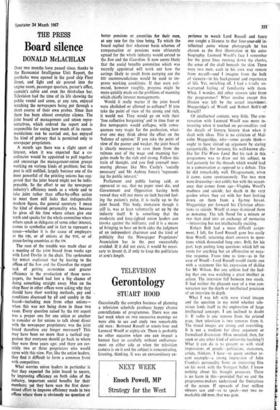Gerontology
TELEVISION STUART HOOD
Occasionally the complex business of planning a television schedule produces happy chance constellations of programmes. There was one last week when on two successive evenings we were able to see and study two remarkable old men: Bertrand Russell at ninety-four and Leonard Woolf at eighty-six. There is probably no other occasion when one can inspect a human face so carefully without embarrass- ment on either side as when the television camera is on it and the subject is concentrating, listening, thinking. It was an extraordinary ex-
perience to watch Lord Russell and fancy one caught a likeness to that four-year-old in- tellectual putto whose photograph he has
chosen as the first illustration in his auto- biography. Leonard Woolf's face I remember for the great lines running down the cheeks, the sense of the skull beneath the skin. These were two men, each in his own way remote from myself—and I imagine from the bulk
of viewers—in his background and experience of life. Yet, switching off. I had a totally un-
warranted feeling of familiarity with them. What. I wonder, did other viewers take from the programmes? What residue except this illusion was left by the actual interviews:: Muggeridge's of Woolf and Robert Boles'ooti Russell?
Of intellectual content, very little. The con- versation with Leonard Woolf was more in- teresting when it touched on personalities and the details of literary history than when it dealt with ideas. This is no criticism of Mal-
colm Muggeridge, who—some people think—
ought to have stirred up argument by stating categorically, for instance, his well-known dis- like for The Waste Land. But his task in this
programme was to draw out his subject, to feel patiently for the threads which would lead to a conversation as opposed to a debate. This
he did remarkably well. Disagreement, when it came, came spontaneously. The two men
were discussing—not coldly but with the accept-
ance that comes from age—Virginia Woolf's madness and suicide, her death in the very
garden where they sat with her bust looking
down on them from a fig-tree bosser. Muggeridge put forward his Christian objec- tions to suicide. Woolf at once dismissed them as nonsense. The talk flared for a minute or two then died into an exchange of memories —interesting but not intellectually exciting.
Robert Bolt had a more difficult assign- ment. I felt, for Lord Russell gave less easily
than Woolf, returning short answers to ques- tions which demanded long ones. Bolt, for his part, kept putting long questions which left no room for anything but an affirmative or nega- tive response. From time to time—as in the case of Woolf—Lord Russell would startle one with a statement like his expression of dislike for Mr Wilson. But one seldom had the feel- ing that one was watching a great intellect in action. The interview fell between two stools. It had neither the pleasant ease of a true con- versation nor the depth or intellectual precision of an interview in depth.
What I was left with were visual images and the question in my mind whether tele- vision lends itself to the exploration of large intellectual concepts. I am inclined to doubt it. If radio is one remove from the printed page, then television is two removes from it. The visual images are strong and overriding. It is not a medium for close argument or formalised discussion. (How unsuited, then, for open or any other kind of university teaching!) What it can do is to present us with vivid impressions of people—politicians, statesmen, artists, thinkers. I have--to quote another re- cent example—a strong impression of John Cranko's personality from an interesting film on his work with the Stuttgart ballet. I know nothing about his thought processes. There is no harm in this—provided that we and the programme-makers understand the limitations of the screen. If upwards of four million viewers saw and—so to speak—met two re- markable old men, that was gain.


































 Previous page
Previous page